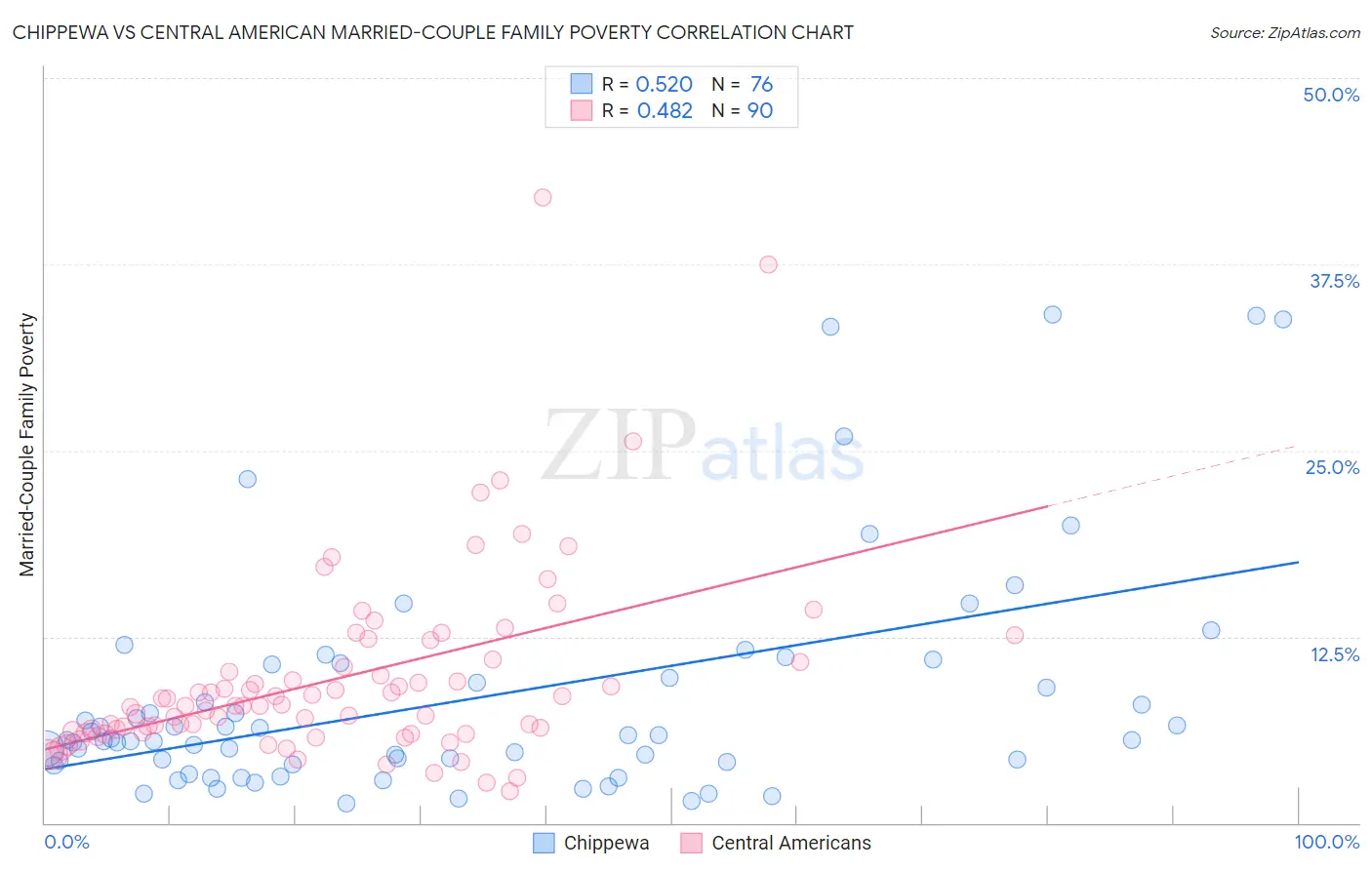Chippewa vs Central American Married-Couple Family Poverty
COMPARE
Chippewa
Central American
Married-Couple Family Poverty
Married-Couple Family Poverty Comparison
Chippewa
Central Americans
5.4%
MARRIED-COUPLE FAMILY POVERTY
18.9/ 100
METRIC RATING
205th/ 347
METRIC RANK
6.7%
MARRIED-COUPLE FAMILY POVERTY
0.0/ 100
METRIC RATING
301st/ 347
METRIC RANK
Chippewa vs Central American Married-Couple Family Poverty Correlation Chart
The statistical analysis conducted on geographies consisting of 213,662,644 people shows a substantial positive correlation between the proportion of Chippewa and poverty level among married-couple families in the United States with a correlation coefficient (R) of 0.520 and weighted average of 5.4%. Similarly, the statistical analysis conducted on geographies consisting of 497,895,847 people shows a moderate positive correlation between the proportion of Central Americans and poverty level among married-couple families in the United States with a correlation coefficient (R) of 0.482 and weighted average of 6.7%, a difference of 23.9%.

Married-Couple Family Poverty Correlation Summary
| Measurement | Chippewa | Central American |
| Minimum | 1.3% | 2.1% |
| Maximum | 34.1% | 41.9% |
| Range | 32.9% | 39.8% |
| Mean | 8.4% | 9.7% |
| Median | 5.6% | 7.9% |
| Interquartile 25% (IQ1) | 4.0% | 6.1% |
| Interquartile 75% (IQ3) | 10.2% | 10.8% |
| Interquartile Range (IQR) | 6.2% | 4.7% |
| Standard Deviation (Sample) | 7.8% | 6.5% |
| Standard Deviation (Population) | 7.7% | 6.4% |
Similar Demographics by Married-Couple Family Poverty
Demographics Similar to Chippewa by Married-Couple Family Poverty
In terms of married-couple family poverty, the demographic groups most similar to Chippewa are Immigrants from Costa Rica (5.4%, a difference of 0.080%), Osage (5.4%, a difference of 0.10%), Immigrants from Africa (5.5%, a difference of 0.24%), Immigrants from Peru (5.4%, a difference of 0.49%), and French American Indian (5.5%, a difference of 0.56%).
| Demographics | Rating | Rank | Married-Couple Family Poverty |
| Immigrants | Belarus | 26.2 /100 | #198 | Fair 5.4% |
| Uruguayans | 25.0 /100 | #199 | Fair 5.4% |
| Immigrants | Morocco | 24.3 /100 | #200 | Fair 5.4% |
| Lebanese | 24.1 /100 | #201 | Fair 5.4% |
| Immigrants | Middle Africa | 23.8 /100 | #202 | Fair 5.4% |
| Immigrants | Peru | 21.8 /100 | #203 | Fair 5.4% |
| Immigrants | Costa Rica | 19.4 /100 | #204 | Poor 5.4% |
| Chippewa | 18.9 /100 | #205 | Poor 5.4% |
| Osage | 18.4 /100 | #206 | Poor 5.4% |
| Immigrants | Africa | 17.6 /100 | #207 | Poor 5.5% |
| French American Indians | 16.1 /100 | #208 | Poor 5.5% |
| Immigrants | Syria | 15.4 /100 | #209 | Poor 5.5% |
| Immigrants | Micronesia | 14.4 /100 | #210 | Poor 5.5% |
| Nigerians | 14.3 /100 | #211 | Poor 5.5% |
| Immigrants | Thailand | 14.0 /100 | #212 | Poor 5.5% |
Demographics Similar to Central Americans by Married-Couple Family Poverty
In terms of married-couple family poverty, the demographic groups most similar to Central Americans are Immigrants from Ecuador (6.7%, a difference of 0.14%), Immigrants from El Salvador (6.8%, a difference of 0.42%), Immigrants from Belize (6.7%, a difference of 0.60%), Nicaraguan (6.7%, a difference of 0.75%), and Cuban (6.8%, a difference of 0.86%).
| Demographics | Rating | Rank | Married-Couple Family Poverty |
| Bahamians | 0.0 /100 | #294 | Tragic 6.6% |
| Immigrants | Uzbekistan | 0.0 /100 | #295 | Tragic 6.6% |
| U.S. Virgin Islanders | 0.0 /100 | #296 | Tragic 6.6% |
| Kiowa | 0.0 /100 | #297 | Tragic 6.6% |
| Immigrants | Guyana | 0.0 /100 | #298 | Tragic 6.7% |
| Nicaraguans | 0.0 /100 | #299 | Tragic 6.7% |
| Immigrants | Belize | 0.0 /100 | #300 | Tragic 6.7% |
| Central Americans | 0.0 /100 | #301 | Tragic 6.7% |
| Immigrants | Ecuador | 0.0 /100 | #302 | Tragic 6.7% |
| Immigrants | El Salvador | 0.0 /100 | #303 | Tragic 6.8% |
| Cubans | 0.0 /100 | #304 | Tragic 6.8% |
| Haitians | 0.0 /100 | #305 | Tragic 6.8% |
| Immigrants | Haiti | 0.0 /100 | #306 | Tragic 7.0% |
| Guatemalans | 0.0 /100 | #307 | Tragic 7.0% |
| Spanish American Indians | 0.0 /100 | #308 | Tragic 7.1% |